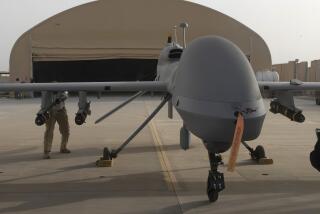Arms and a Man: Helping Saddam : The case of Honeywell’s fuel-air explosives
- Share via
It would be foolishness beyond calculation for the West to accept responsibility for the rise of Saddam Hussein. But it would be foolishness beyond forgiveness for the West--and, particularly, for the United States--to deny that it has helped make the Iraqi strongman a far more deadly threat to the world at large than he otherwise would have been.
Partly through an excess of of “strategic thinking” and partly through an excess of garden-variety venality, the Western democracies have helped arm Saddam’s armies to the teeth with martial technologies Iraq never could have developed on its own. The consequences of this historic miscalculation may yet be paid by the young men and women of the anti-Saddam forces now arrayed along the Kuwaiti border.
Through Iraq’s decade-long war with Iran’s Islamic fundamentalist government, the West felt it was in its strategic interest to assist Baghdad’s “secular” regime with military hardware. The American, French, German and other Western companies that manufacture such devices had a profit motive to cooperate.
Times writer Douglas Frantz provided an exemplar of this union of policy and economics in a recent story detailing how Honeywell Inc., one of America’s largest defense contractors, sold Iraq the technology required to develop fuel-air explosives, 10 times more powerful than conventional explosives. Such devices consist of a bomb--or missile warhead--containing one or more canisters of fuel. An initial explosion disperses the fuel, usually propane or ethylene oxide, as a cloud over the target. A second detonation moments later ignites the cloud, creating a huge fireball and powerful shock wave. Such weapons are particularly effective in flat desert terrain, and some experts believe they may be the deadliest devices in Saddam’s arsenal.
Honeywell, which designed the fuel-air explosives for the U.S. military, sold a 300-page study of the requisite technologies--and a guide to their application to appropriate targets--to a Swiss firm acting as an agent of Iraq and Egypt.
At the time, Honeywell’s own employees, including the physicist who compiled the report, objected to the sale.
However, the firm went forward with the deal, because, as a preliminary Pentagon review of the case already has determined, no laws were violated and no classified or restricted material was involved.
On the other hand, two Iraqi efforts to purchase ready-made fuel-air bombs were blocked because as “significant military weapons,” they were subject to export controls.
Nor was Honeywell alone in such sales. According to a Senate Foreign Relations Committee report, 132 companies from 14 Western nations have sold military goods to Iraq. Among them are 68 German and 10 American firms.
When those and similar sales around the world resulted only in the deaths of people from the Third World, they may have seemed to some people like the regrettable consequences of sound policy--and good business.
The world may yet learn to see them in another light.
More to Read
Inside the business of entertainment
The Wide Shot brings you news, analysis and insights on everything from streaming wars to production — and what it all means for the future.
You may occasionally receive promotional content from the Los Angeles Times.










